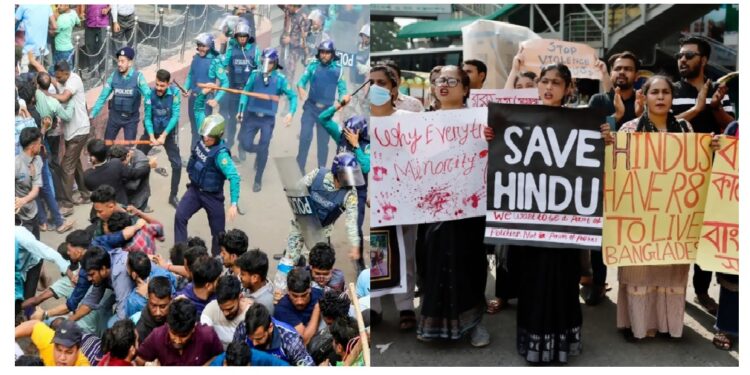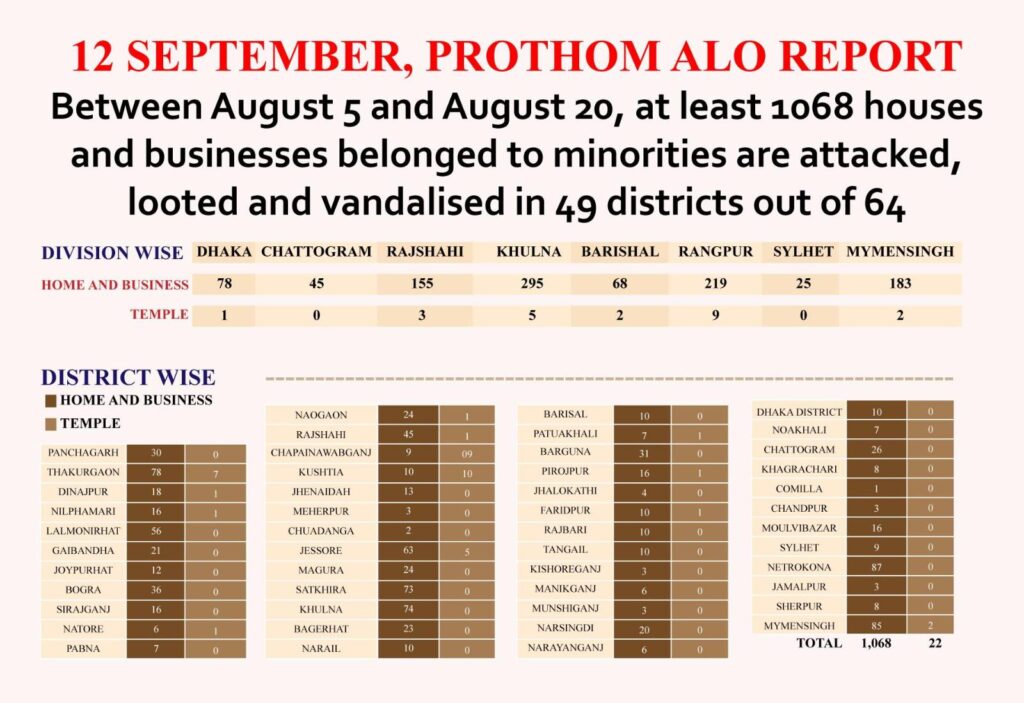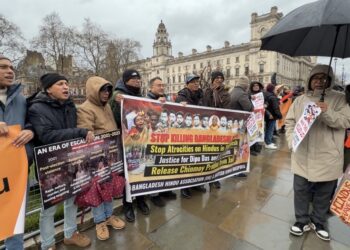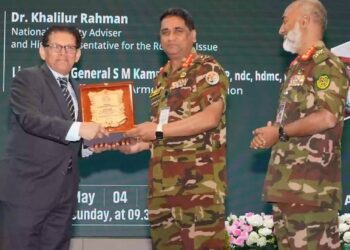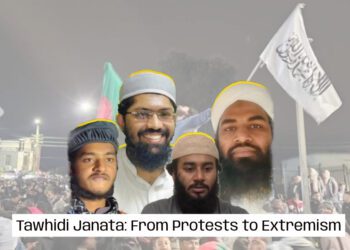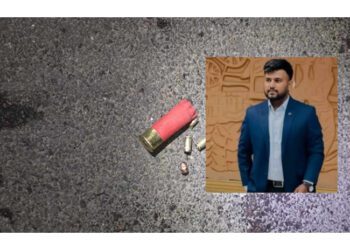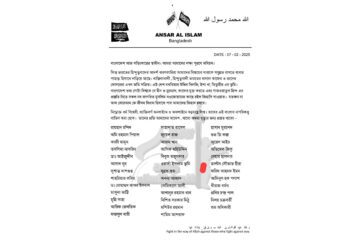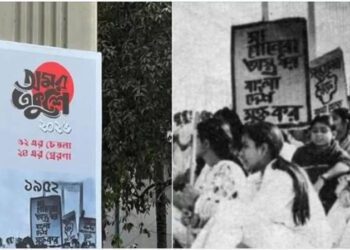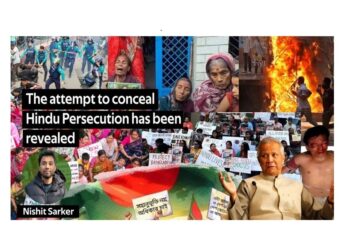Over the course of five months under the interim government, there have been 98 reported instances of alleged mob killings and thousands of reported instances of attacks on minorities.
The 2024 Human Rights Monitoring Report by Ain O Salish Kendra (ASK) and Manabadhikar Shongskriti Foundation (MSF) highlights a disturbing wave of extrajudicial executions, despite official commitments to end killings without trial.
According to ASK, 12 individuals died in custody or were victims of extrajudicial killings during the first five months of the interim government. Meanwhile, MSF reported 98 deaths from mob lynchings in the same period.
These findings, based on media reports and independent investigations, provide a comprehensive overview of human rights violations linked to the July-August uprising, including police shootings, internet shutdowns, and raids targeting protesters.
They also document attacks on minorities, shrines, and journalists, along with violence surrounding the controversial Jan 7 election.
The reports highlight police shootings at unarmed individuals and torture at the police’s Detective Branch office, with ASK reporting 858 people killed and 11,551 injured during the Anti-discrimination Student Movement, based on government data.
Among the dead were 11 women and 129 children, some of whom tragically died in their own homes during the uprising.
Families faced numerous obstacles in retrieving bodies from hospitals.
On Aug 5, citizens joined protests in Dhaka, prompting the former prime minister Sheikh Hasina to flee the country.
MINORITY OPPRESSION
According to the ASK report, there were 147 incidents of vandalism of houses, temples and businesses of the minority Hindu community in different parts of the country in 2024.
Among these, 408 houses were attacked and vandalised, 36 were set on fire, 113 businesses were vandalised, 32 temples and mosques of the Ahmadiyya community were attacked, and 92 idols were vandalised in Hindu temples.
Three people from the Hindu community and one from the Ahmadiyya community were killed, and at least 82 people were injured.
After the arrest of ISKCON leader Chinmoy Krishna Das, Chattogram lawyer Saiful Islam Alif was killed in an attack by Sanatanis.
The family of the deceased Alif asked the ASK for justice for Saiful’s murder and punishment of the culprits.
On Dec 3, a 20-year-old youth named Akash Das from Dowarabazar and Monglargaon village in Sunamganj was accused of posting a “derogatory post” about Islam.
Although the post was deleted, tension spread among the people of the area after the screenshot.
Dowarabazar police arrested Akash on the day of the incident.
Later, locals attempted to snatch the youth from the police to kill him. To ensure his safety, police took him to Sadar Police Station.
According to police, the mob vandalised and damaged the hundreds of homes, shops and the local Loknath temple of the Hindu community on that day.
The situation was brought under control in the presence of the district SP, DC, army and police. Police are investigating to identify and arrest those involved in the incident.
The ASK report highlighted incidents in Khulna and Faridpur districts, where two youths from minority communities were “mercilessly” beaten in the presence of law-enforcing agencies and army personnel for allegedly commenting on Facebook.
EXTRAJUDICIAL KILLINGS
ASK report noted that while the frequency of extrajudicial killings has declined, these incidents continue to occur.
It emphasised that impartial investigations and fair trials for such cases have yet to be achieved.
Data from 2024 shows 21 individuals were either killed extrajudicially or died while in the custody of law-enforcing agencies.
Among these, 12 deaths occurred after the current interim government assumed power.
MSF documented 22 deaths in alleged gunfights, including six under the current regime. Impartial investigations and fair trials remain elusive.
UNPRECEDENTED COURTROOM INCIDENTS
ASK described extraordinary incidents in the judiciary after the interim government’s arrival, including judges being pelted with eggs and 12 High Court judges placed on leave.
This marked a first in Bangladesh’s history.
In Jashore, 167 Awami League leaders and activists were denied bail and jailed, with their defence lawyer later arrested.
Across the country, political detainees faced assaults even while in police custody, and their lawyers were harassed and beaten.
Cases were filed against professionals with no connection to alleged incidents, often as a means of extortion or coercion.
IMPUNITY
The ASK report noted that on Oct 14, the Ministry of Home Affairs issued a statement declaring that no cases, arrests, or harassment would occur in connection with events from the July Uprising, spanning Jul 15 to Aug 8.
The statement read: “The mass uprising on Aug 5th led to the fall of the autocratic and fascist government, marking the start of a new journey to build a Bangladesh free from discrimination.
“The students and the people actively worked towards this success. No cases, arrests, or harassment will be filed related to the mass uprising.”
However, human rights activist Sara Hossain expressed concerns, saying, “It is important not to use impunity orders to shield those involved in violent crimes.”
She urged the government to clarify its stance on this issue.
The ASK report also emphasised attacks on minorities or political retaliation “cannot be considered acts related to protests”.
Protest organisers have disavowed responsibility for destructive incidents such as burning metro stations, setting fire to police stations, and killing officers, describing these as acts of “mob violence” for which they should not be held accountable.
DEATHS IN CUSTODY
The ASK report revealed 65 individuals died in the country’s prisons this year, including 23 prisoners and 42 detainees, compared to 106 deaths in custody in 2023.
The report highlighted a concerning pattern in Bogra prison, where four Awami League leaders died within 29 days, allegedly due to “heart disease”.
These deaths, which occurred between Nov 11 and Dec 9, include Shahadat Alam alias Jhunu, 57, an organising secretary of the Bogra District Awami League, who died on Nov 26; Abdul Latif, 67, the treasurer of the Shibganj Upazila Awami League, who died on Nov 25; Shahidul Islam alias Ratan, 58, general secretary of Ward 15 of Bogra Municipality, who died on Nov 11; and Abdul Matin alias Mithu, 65, a member of Gabtoli Upazila Awami League, who died on Dec 9.
The report called for an investigation into these deaths.
MOB VIOLENCE
The ASK reported a sharp increase in deaths from mass beatings, with 128 people killed in 2024 compared to 51 in 2023.
The report noted that incidents of “mob justice” during the interim government were particularly alarming, citing the beating of a young man at Dhaka University as a case that sparked widespread outrage.
It also mentioned that political activists were increasingly targeted.
One example highlighted was the Sept 7 death of Abdullah Al Masud, a former Chhatra League leader at Rajshahi University, who was beaten to death despite walking with an artificial leg.
The MSF also reported 146 deaths from mob lynchings in 2024, 98 of which occurred in the five months following August.
JOURNALIST HARASSMENT
After the new government took office, the issues of attacks on news organisations, cancellation of journalists’ accreditation cards, and lawsuits against journalists have been highlighted in the ASK report.
It said throughout the year, 531 journalists faced various forms of torture, harassment, threats, and obstacles in carrying out their professional work.
Of these, at least 219 journalists were attacked while carrying out their professional duties.
During the 12th National Parliament elections, 30 journalists were assaulted and attacked while performing their duties.
Six people were shot dead during the Anti-discrimination Student Movement and one was murdered by miscreants.
In addition, 130 journalists were victims of lawsuits after the Anti-discrimination Student Movement.
The interim government cancelled the permanent and temporary accreditation cards of journalists in three phases.
The ASK report says there have been attacks against various media organisations in the country, including slander and threats of siege.
According to the ASK briefing, whenever the interests of some quarters go beyond the limits, the media is attacked, journalists are harassed, and attempts are made to control them, which is a dangerous sign of the possibility of a free press.
– bdnews24.com

